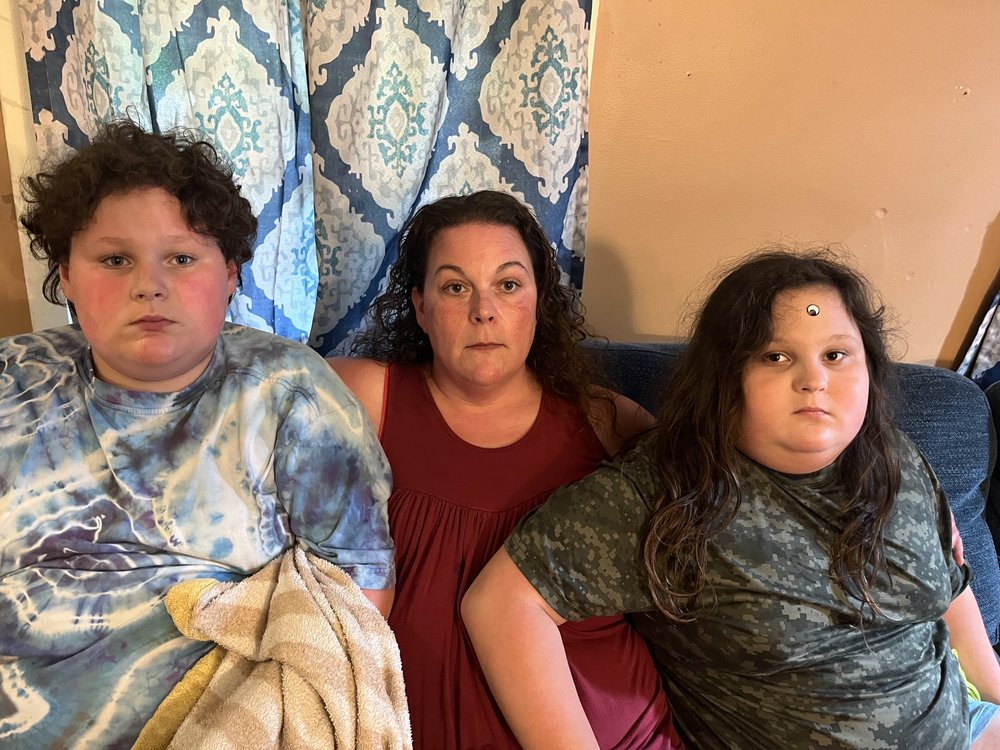Trump is cutting $1 trillion from Medicaid. Here’s what that means for NJ.
July 17, 2025, 1 p.m.
State Human Services Commissioner Sarah Adelman says there’s “no scenario” in which New Jersey can make up the difference. Many residents expect to lose coverage.

Theresa Luoni of Basking Ridge, New Jersey is bracing for the roughly $1 trillion in cuts to Medicaid that President Donald Trump signed into law this month. As a single mother of twin boys with severe autism, so much of her time is committed to their care, she'd have a hard time meeting the law's new work requirements in order to still qualify for their medical and educational care once they turn 14 next year, she said.
“They require the supervision of a 2-year-old because they don't always understand danger,” Luoni said. “It's pretty stressful on a regular basis.”
New Jersey alone stands to lose $3.3 billion in federal Medicaid funding, according to the state Department of Human Services. Commissioner Sarah Adelman told Gothamist there is "no scenario" in which the state could make up the difference. Her agency estimates that 350,000 New Jerseyans will lose their health coverage under the new law.
And she said most states will struggle to meet new mandates to recertify patients' eligibility every six months instead of each year, essentially doubling their workload and potentially kicking more people off the rolls.
“It really can't be understated,” Adelman said. "The consequences here are dire.”
The Trump administration did not respond to a request to comment on the cuts.

Luoni expects her and her sons — Dylan and Max — to be among those who lose coverage. Because of their disabilities, her sons’ health insurance and school-based services are covered under Medicaid. Both boys attend school out of district because their local public school can’t provide the services they need.
Max is Luoni’s “technology whiz.” She said he loves making and editing videos, and even taught himself some Spanish and Arabic watching YouTube. Dylan is her “biggest helper.” He’s always making sure everything is where it needs to be, she said. If there’s a chair that’s been put back at the table incorrectly, he’s the first one to straighten out its legs.
Dylan is completely nonverbal. Max is pre-verbal. He can speak a few words to people but won’t always understand their response. Because of the challenges of caring for her sons, Luoni is only able to work at most 12 hours a week at a retail store, far below the new work requirement. Under the new law, once her sons turn 14 next year, Luoni will have to meet the work requirements of 80 hours a month, which she said she’s unable to do.
“When the school calls and your kid has to be picked up or there's an emergency meeting … I'm lucky enough that my former employer is very understanding and lets me work 12 hours a week,” she said.
Even if she’s able to retain coverage for her sons somehow, having to fill out a “huge packet” of paperwork every six months to recertify feels daunting to her.
“There's no way that there won't be a reduction in services,” she said. “ It really does erase the chance for a lot of these children to have a future.”
Luoni said she’s tried to get “concrete answers” via social media, email and through phone calls to her congressional Rep. Thomas Kean Jr., a Republican who voted in favor of the bill.
Kean’s office didn’t respond to a request to be interviewed for this story. The day before Trump signed it into law on July 4, Kean issued a statement that the bill would “safeguard” Medicaid for every “intended” recipient, while “rooting out waste, fraud and abuse.”
Luoni said she’s been unable to get a response from Kean’s office on how her disabled children will be affected.
“ I think the saying is 'no response is a response.' So that means the people that were elected to take care of people like me and my children, to me, the message is they just don't care,” she said.
‘It’s going to be a disaster’
Dr. Eileen Conti, an ophthalmologist in Bedminster, New Jersey, said she’s seen how losing Medicaid can affect patients’ health.
Conti, who runs a private practice with her husband, said she was treating a woman for glaucoma who was supposed to come in every three months to have her eye pressure checked. But she stopped showing up because her Medicaid lapsed and she couldn’t cover the cost of appointments and eye drops..
“She disappeared,” Conti said.
After a year of missed appointments, the woman lost vision in one eye.
Conti said she fears the impending cuts will cause more patients to stop seeking treatment, particularly for “painless” diseases like glaucoma.
“ People are going be like ‘I don't need the drops and I can't afford them’ — and they're going to be coming in blind,” she said.
Conti said the shift could also put further financial strain on hospitals if more patients avoid private practices like hers due to affordability concerns.
“The hospital eats the cost, that's why hospitals are going under because you can't turn a patient away. … And if all these millions of people are losing their insurance, what are the hospital's going to do?” she said. “It’s going to be a disaster.”
'There's really no state that is prepared'
Adelman, commissioner of the state agency that manages Medicaid funding, said it’s still unclear whether families like Luoni’s will lose their coverage under Trump’s bill.
“I share her concern as well,” Adelman said.
The agency is still waiting on guidance from the federal government on how the cuts will be implemented. But she said the law as written is “really devastating” for New Jersey and that processing the six-month verifications would double the workload for local county social services agencies.
“ There's really no state that is prepared to implement the work requirement provisions of the bill,” she said.
Adelman said many people don't have electronic pay stubs, or are gig workers or caregivers who can’t quickly produce proof in a short time that they're meeting the 80-hour-a-month requirement.
“ I think a lot of people hear work requirements for able-bodied adults and think that sounds reasonable, but we know the actual impact of what's in the bill will be that working adults and people who are eligible are going to lose,” she said.
And while most of the funding cuts aren’t set to take effect until after midterm elections next year, Adelman said New Jersey is waiting on the Centers for Medicare and Medicaid Services to release about $3 billion in federal funds tied to the current fiscal year.
“That's something we'll have to track closely now that the bill has passed to ensure that our spending for the current fiscal year is approved,” she said.
Trump’s tax bill will raise NJ’s high energy costs even higher, Murphy admin says NJ towns are reckoning with carnage from second deadly flash floods in 10 days Can tax relief keep seniors from fleeing NJ? Some worry about the cost.